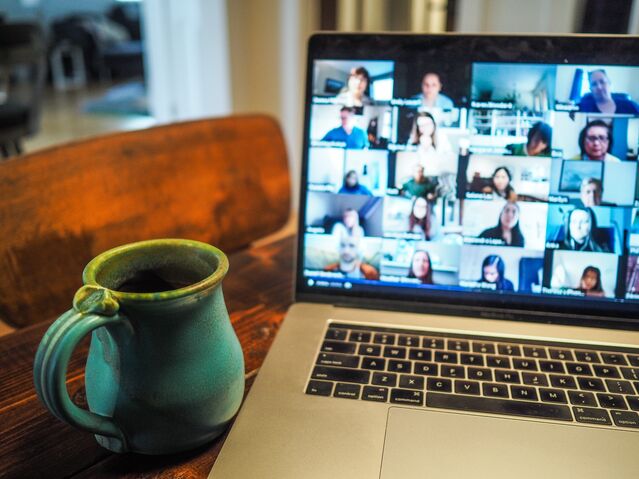Career
Why Are We “Time Traveling” Back to 2019?
Let’s be mindful of silver linings from the pandemic era.
Posted August 20, 2021 Reviewed by Ekua Hagan
Key points
- Some view the pandemic as having been a temporary interruption of "normal life" and now rush to return to old habits and behaviors.
- The pandemic inspired many changes beneficial to well-being, such as flexible work cultures and fewer carbon emissions from commuters.
- Escaping the pandemic shouldn't mean giving up on progressive goals; instead, we can continue to be mindful.

We’re now over 18 months into a devastating global pandemic that has fundamentally altered the way people live their lives. As I wrote previously, the way we normally eat, work, shop, or play was turned upside down. Millions around the world have fallen ill or died, and untold others have suffered extreme distress, emotional pain, and economic devastation. We are still battling the delta variant but thanks to vaccines, we are slowly trending toward the light at the end of the tunnel.
But it appears that many folks, while incredibly eager to escape from the pandemic, are rushing to revert back to exactly the way life was in 2019 before the plague emerged. They view the pandemic era as a temporary interruption of our “normal lives.”
Remembering what psychological science can teach us, I hold a different view. I suggest we approach the future with mindfulness. After all, research has shown that distressing emotions can distort reasoning and impair decision-making. There is some evidence that stressful situations cause “habit behavior,” in which people to gravitate toward familiar routines rather than goal-oriented behaviors. When we’re in a highly stressful period (like a pandemic) we can lose sight of our motivations and values, choosing instead the comfortable and familiar. This is unwise.
A mindful approach, with less emotional reactivity, will lead to clearer thinking, compassion, and wisdom. There are some things we’ve done differently during the pandemic that are worth preserving because the “normal” life we had was far from perfect. Perhaps we can think about how to capitalize on some of the silver linings around the COVID-19 cloud.
Let's Keep The Progress We've Made
Speaking of clouds, did you know that air pollutants decreased by as much as 60% in cities around the globe during lockdowns in 2020? Not to mention a record-breaking drop in carbon emissions that cause climate change. Crime also fell by over 35% in dozens of cities. And despite the spread of the novel coronavirus, we virtually eliminated the regular flu, with only about two thousand cases over the past year which is down from 38 million cases the year before! That’s astonishing.
Let’s also consider psychological variables. Data from adolescents in the UK reveal that those with above-average mental health before the pandemic felt a decline in their well-being in 2020. But those who had below-average mental health experienced an improvement in their well-being, particularly in terms of emotional stability and increased mental strengths. The pandemic, while psychologically excruciating for many individuals, also brought opportunities for insight, growth, and creativity.
Other data show that life satisfaction and loneliness remained stable during 2020, while the suicide rate actually decreased. The doom forecasting about heightened conflicts in romantic partnerships as partners stayed at home turned out to be false. Most couples were doing just fine with a lot of increased quality time and shared space.
Another benefit of the pandemic era was increased flexibility and autonomy at work. One analysis found that nearly 40% of American jobs can be done from home, and a recent global survey revealed that a majority said they would consider leaving their jobs in favor of more flexible hours and the freedom to work remotely. Part of this is likely because working from home eliminated the need for long daily commutes to offices, which are linked with decreases in happiness and worse mental health. Who could have guessed that people strongly prefer spending more of their day with their children compared to time spent in office buildings or on highways? Maybe that’s why a majority of parents surveyed want to continue remote work after the pandemic. This extra free time and flexibility have led to increased overall productivity, especially among knowledge workers (scientists, accountants, lawyers, academics, etc.). Working from home also boosted small business performance. Not to mention that those with disabilities benefit from the “accessible pandemic.”
But we shouldn’t assume that everyone has had the same lived experiences. Those who are eager to return to pre-pandemic routines tend to be older (e.g., Baby Boomers) and more socially conservative, and have more traditional attitudes about in-person office culture. Those who live alone or whose best friends are coworkers (or who are generally more extroverted) may be desperately craving more in-person social interactions outside their homes, including in the workplace. And then there are those who are just burned out from staring at their computer screens.
It appears that we are divided. And not just politically, but socially as well. Some folks desperately want to go back to the way things were before this plague struck. Other folks (I’m one of them) want to maintain many of the positive changes we’ve made. I suggest we navigate these social conflicts the same way we ought to approach political conflicts, with a spirit of mindfulness. What are the pros and cons of the ideas being considered? Why do you think that others hold different viewpoints? What is gained by admitting when political rivals have good ideas? Is there a new office culture that will allow most people to get what they want?
We should all care about paving the best way forward into this new, post-pandemic era of human society, which will probably look and function much different than society before 2020. And liberals can lead the way as imaginative innovators who are using this moment to generate solutions to make our lives better.
Flexible Workplaces Reflect Progressive Values
It doesn’t surprise me to see major companies adopting hybrid work models as a reflection of their progressive values, along with flexible hours, unlimited vacation time, 3-day weekends, and more autonomy-supportive policies. Even entire nations are doing this, with Spain and Iceland switching to a 4-day work week with great success. In societies with already robust social safety nets, these leaders also realize that the traditional in-office work culture is an “antiquated relic” of the past that should be disrupted in favor of other systems that promote our well-being.
And for those who ripped their masks off as soon as mandates were lifted, or who love traveling for their job and want someplace else outside the home to work 5 days a week, they should be able to have their needs met as well. But we shouldn’t forget that the needs and goals of those folks must be balanced with others who have different motivations, especially considering that we still need to find cooperative solutions to the world’s biggest environmental and ecological problems. So let’s use this moment as a time to practice mindful communication with those we disagree with and work together to build creative solutions that will work for all of us.
References
Starcke, K., Wiesen, C., Trotzke, P., & Brand, M. (2016). Effects of acute laboratory stress on executive functions. Frontiers in Psychology, 7, 461.
Porcelli, A. J., & Delgado, M. R. (2017). Stress and decision making: effects on valuation, learning, and risk-taking. Current Opinion in Behavioral Sciences, 14, 33-39.
Schwabe, L., & Wolf, O. T. (2009). Stress prompts habit behavior in humans. Journal of Neuroscience, 29(22), 7191-7198.
Smeets, T., Van Ruitenbeek, P., Hartogsveld, B., & Quaedflieg, C. W. (2019). Stress-induced reliance on habitual behavior is moderated by cortisol reactivity. Brain and Cognition, 133, 60-71.
Venter, Z. S., Aunan, K., Chowdhury, S., & Lelieveld, J. (2020). COVID-19 lockdowns cause global air pollution declines. Proceedings of the National Academy of Sciences, 117(32), 18984-18990.
Kumari, P., & Toshniwal, D. (2020). Impact of lockdown on air quality over major cities across the globe during COVID-19 pandemic. Urban Climate, 34, 100719.
Liu, Z., Ciais, P., Deng, Z., Lei, R., Davis, S. J., Feng, S., ... & Schellnhuber, H. J. (2020). Near-real-time monitoring of global CO 2 emissions reveals the effects of the COVID-19 pandemic. Nature Communications, 11(1), 1-12.
Hu, Y., & Qian, Y. (2021). COVID-19 and Adolescent Mental Health in the United Kingdom. Journal of Adolescent Health, 69(1), 26-32.
Aknin, L., De Neve, J. E., Dunn, E., Fancourt, D., Goldberg, E., Helliwell, J. F., ... & Ben Amor, Y. (2021). Mental health during the first year of the COVID-19 pandemic: a review and recommendations for moving forward. Perspectives on Psychological Science.
Dingel, J. I., & Neiman, B. (2020). How many jobs can be done at home?. Journal of Public Economics, 189, 104235.
Clark, B., Chatterjee, K., Martin, A., & Davis, A. (2020). How commuting affects subjective wellbeing. Transportation, 47(6), 2777-2805.
Bristow, J. (2019). Mindfulness in politics and public policy. Current Opinion in Psychology, 28, 87-91.




